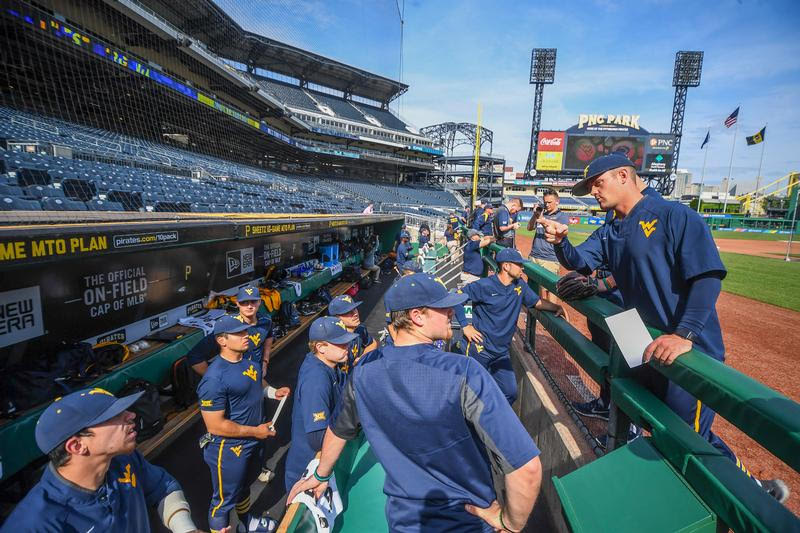 West Virginia Assistant Coach Steve Sabins helped lead his 2016 Mountaineers to the NCAA postseason for the first time in 21 years, the first time in school history that WVU earned an at-large bid. West Virginia qualified for its second-straight NCAA Tournament in 2017. IP caught up with Sabins, who has a vast amount of prior experience in multiple positions at Oklahoma State and in college summer leagues, to find out what makes the Mountaineer program tick...
Inside Pitch: How would you rank the following: 60 times, throwing velocity from position, batting velocity (exit speed)?
Steve Sabins:
West Virginia Assistant Coach Steve Sabins helped lead his 2016 Mountaineers to the NCAA postseason for the first time in 21 years, the first time in school history that WVU earned an at-large bid. West Virginia qualified for its second-straight NCAA Tournament in 2017. IP caught up with Sabins, who has a vast amount of prior experience in multiple positions at Oklahoma State and in college summer leagues, to find out what makes the Mountaineer program tick...
Inside Pitch: How would you rank the following: 60 times, throwing velocity from position, batting velocity (exit speed)?
Steve Sabins: They all probably serve their own purpose in giving a coaches a rough estimate on baseline strength and athleticism. I’d take them all with a grain of salt unless they fall into the “extraordinary” category. If I had to rank them...first is 60 time, second would be throwing velo, and third would be exit speed.
IP: What is would you consider a “must have” for a recruit?
SS: Often the hardest things to measure are the “must haves” in recruits. Intangibles make players. Skill and athleticism are probably on a sliding scale when it comes to the ability needed to compete at certain levels of college baseball.
IP: In your opinion, what is the biggest red flag in a potential recruit?
SS: For me, red flags usually revolve around high levels of “self-love,” the people inside a recruit’s “inner circle,” off-field issues, and poor academics!
IP: What did you do as a volunteer that prepared you for your role as a recruiting coordinator? How did working in collegiate summer ball prepare you?
SS: Being a volunteer was a major promotion as far as I was concerned. I actually held two positions at Oklahoma State before becoming the volunteer assistant. The first position is known as a “graduate manager” of sorts, just doing anything asked of me while completing a Master’s Degree. After two years, I was hired as the Director of Player Development and a year after that, I became the volunteer assistant. All those roles helped prepare me to be a recruiting coordinator. I had to step back, learn, listen, and develop a game plan of how I thought I could impact our players and program. I’m living that “game plan” now.
IP: What does a typical visit look like for you guys in terms of schedule, activities, etc?
SS: Our roster is loaded with players from all over the country, so most prospective student athletes fly in to visit our campus. Visits are highly organized and usually consist of several key components: campus/facilities tour, meeting individuals inside our program and university, spending time with our players, entertainment (usually in the form of WVU sporting event), explanation of our player development program, explanation of where our program is now and future projections of where we are headed. We also detail our roster needs, where the recruit fits into our future projections, and answer as many questions from the family that we can!
IP: How do you stay organized with all of the players you see throughout the year?
SS: A very detailed Excel spreadsheet. I’m learning that prioritizing players and recruits is very important; you can only see so many players and if you’re not organized, you can work extremely hard and not get anything accomplished.
IP: What's your advice to young coaches like yourself when it comes to moving up, applying, interviewing etc for jobs?
SS: I’m not an expert in this regard. I tried to improve the program in the small area I could control. I was given more responsibility and then tried to improve the program with that responsibility. I didn’t ask for permission very often; If I thought something would help, I just did it. I bit off more than I could chew most the time, and learned how to do things others didn’t want to do. I got a shot as an assistant and am very lucky/thankful for that.